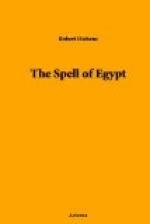these shapes, proportions, different levels, and heights,
are seen in dimness. Not that jewelled dimness
one loves in Gothic cathedrals, but the heavy dimness
of windowless, mighty chambers lighted only by a rebuked
daylight ever trying to steal in. One is captured
by no ornament, seduced by no lovely colors.
Better than any ornament, greater than any radiant
glory of color, is this massive austerity. It
is like the ultimate in an art. Everything has
been tried, every strangeness
bizarrerie, absurdity,
every wild scheme of hues, every preposterous subject—to
take an extreme instance, a camel, wearing a top-hat,
and lighted up by fire-works, which I saw recently
in a picture-gallery of Munich. And at the end
a genius paints a portrait of a wrinkled old woman’s
face, and the world regards and worships. Or all
discords have been flung together pell-mell, resolution
of them has been deferred perpetually, perhaps even
denied altogether, chord of B major has been struck
with C major, works have closed upon the leading note
or the dominant seventh, symphonies have been composed
to be played in the dark, or to be accompanied by
a magic-lantern’s efforts, operas been produced
which are merely carnage and a row—and at
the end a genius writes a little song, and the world
gives the tribute of its breathless silence and its
tears. And it knows that though other things may
be done, better things can never be done. For
no perfection can exceed any other perfection.
And so in Edfu I feel that this untinted austerity
is perfect; that whatever may be done in architecture
during future ages of the world, Edfu, while it lasts,
will remain a thing supreme—supreme in form
and, because of this supremacy, supreme in the spell
which it casts upon the soul.
The sanctuary is just a small, beautifully proportioned,
inmost chamber, with a black roof, containing a sort
of altar of granite, and a great polished granite
shrine which no doubt once contained the god Horus.
I am glad he is not there now. How far more impressive
it is to stand in an empty sanctuary in the house
divine of “the Hidden One,” whom the nations
of the world worship, whether they spread their robes
on the sand and turn their faces to Mecca, or beat
the tambourine and sing “glory hymns”
of salvation, or flagellate themselves in the night
before the patron saint of the Passionists, or only
gaze at the snow-white plume that floats from the
snows of Etna under the rose of dawn, and feel the
soul behind Nature. Among the temples of Egypt,
Edfu is the house divine of “the Hidden One,”
the perfect temple of worship.
XV
KOM OMBOS




